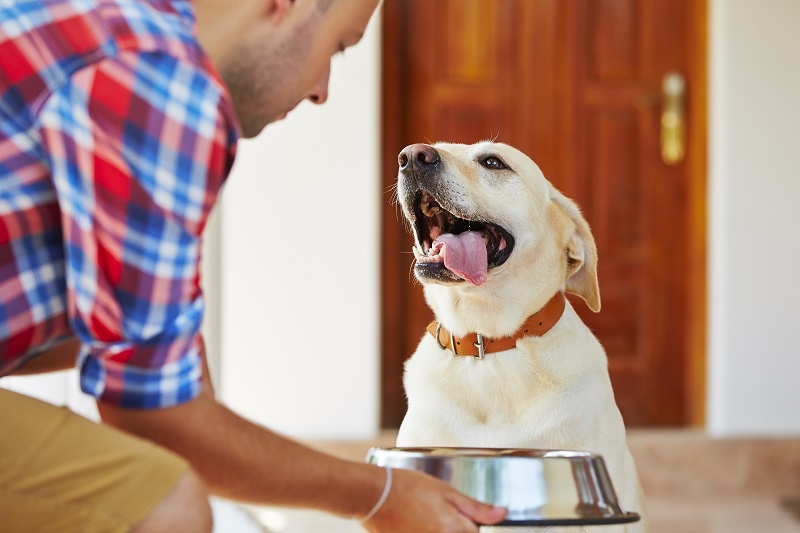What makes a good dog diet? A simple question that opens a whole can of worms!
The short answer is that a good dog diet is one which keeps the dog in good physical and mental condition, is enjoyed by the dog, is safe for the dog and the people around it, and which fits the owner’s budget.
If you are buying a complete food (wet, dry, or raw) then it should meet minimum nutritional values laid down by an organisation called FEDIAF. Some foods look like complete diets but are labelled ‘complementary’ and will need to be mixed with other things to ensure your dog gets a balanced diet. Many owners make their own home-cooked or raw dog diets, but studies suggest that few of these are nutritionally balanced. Concerns have also been raised over high levels of bacteria in some raw foods so extra advice and care should be taken with these.

Protein is a very important component of a dog’s diet, but it isn’t always clear from the label if the protein comes from animal or vegetable sources. Certain essential amino acids and vitamins are only found in significant quantities in meat, fish, offal, eggs, or dairy products. Diets very low in animal products may lack these essential amino acids unless synthetic supplements are added. Many health problems (including skin disease, eye problems, heart disease, and behavioural problems) can be caused by vitamin or essential amino acid deficiencies.
Carbohydrates are not essential for dogs to eat as they can synthesise their own inside their cells. However, carbohydrates from grains and root vegetables provide a useful source of energy for dogs. Dogs are able to digest starches more efficiently than their wolf relatives, which may explain why they are so much more successful and can thrive on a wider range of diets. Fibre is a carbohydrate and MOS and FOS from plant sources are prebiotics which help to maintain a healthy gut flora.
Fats are the best source of energy providing 2 ½ times more calories per gram than carbohydrates or proteins. They also provide important fat-soluble vitamins and essential fatty acids. A diet with insufficient fat can lead to skin problems, reproductive problems, and poor brain function.
There may be nothing wrong with a food that lists its ingredients as simply ‘meat and animal derivatives, cereals, oils and fats, sugars, nutritional additives’, but I prefer foods which tell you the actual ingredients. This allows you to avoid protein sources which your dog may be sensitive to, and means you are more likely to be buying a ‘fixed formula’ food, where the ingredients are the same every time. People will tell you to look for meat as the number one ingredient, but some really good foods will not have meat at the top of their ingredient list. This is often because they contain dried meat rather than fresh meat, which weighs much less than its fresh counterpart but gram for gram provides far more protein.
Cereals as an ingredient are not necessarily a sign of a poor food as very few dogs actually have an intolerance to cereals or gluten, but some owners prefer to avoid them. Unfortunately, there have been scares in the US related to ‘grain free’ foods. A number of dogs have suffered heart problems whilst on these diets. The exact cause is not known, but it is thought that a high pulse and legume content may be blocking the absorption of taurine and carnitine, or that the use of exotic meats may play a role.
If your dog enjoys his food and is healthy, there is probably no need to change his diet. But changes to his behaviour, skin and coat, activity levels, or faecal quality might suggest that his diet doesn’t suit his needs. If you are worried about your dog’s diet your vet will be happy to discuss your concerns.

